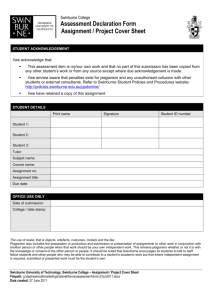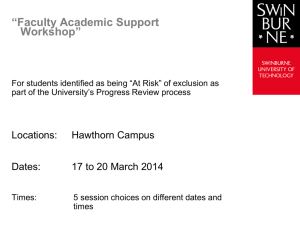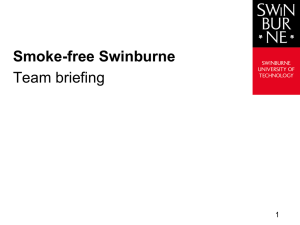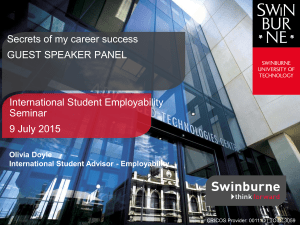Presentation slides - Swinburne University of Technology
advertisement
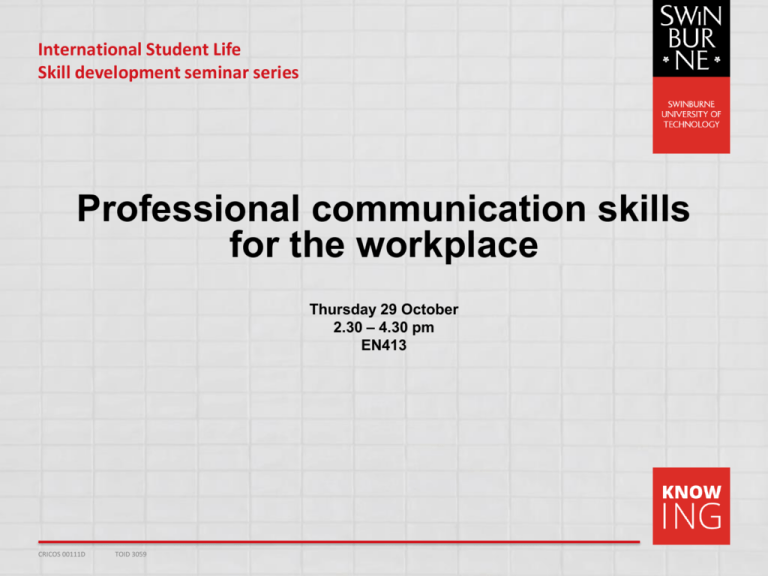
International Student Life Skill development seminar series Professional communication skills for the workplace Thursday 29 October 2.30 – 4.30 pm EN413 CRICOS 00111D TOID 3059 Welcome Olivia Doyle International Student Advisor – Employability Tel 9214 8248 Email odoyle@swin.edu.au International Student Life: Employability support Swinburne Specialist support for international students aiming to work in partnership with you to develop your employability Provide professional insights and guidance Connect you with programs, events and activities to advance your professional career internationally and in Australia Employability road map – a professional development guide for each stage of your Swinburne student life cycle More details: www.swinburne.edu.au/student/international/employability SCIENCE | TECHNOLOGY | INNOVATION | BUSINESS | DESIGN 3 Final events for 2015 Professional Job Search Intensive Wednesday 25 November 9.30 am – 1.30 pm TD121 Bupa Business Insight Visit Friday 27 November 9.30 am - noon SCIENCE | TECHNOLOGY | INNOVATION | BUSINESS | DESIGN Swinburne International Student Life Employability Swinburne Monthly Employability News Regular program of employability seminars Skill seminars Student appointments Connections Networking events Cross cultural events SCIENCE | TECHNOLOGY | INNOVATION | BUSINESS | DESIGN 5 • Your professional career starts Swinburne NOW UPDATE LINK http://www.swinburne.edu.au/careers/pep SCIENCE | TECHNOLOGY | INNOVATION | BUSINESS | DESIGN 6 Swinburne •‘International students are too focused on their studies and think about careers and employment too late in the careers lifecycle.’ • Rob Lawrence, Improving the employment outcomes of international students’ 2013 SCIENCE | TECHNOLOGY | INNOVATION | BUSINESS | DESIGN 7 Swinburne Employability ‘Road Map’ Swinburne Guide for your development through each stage of your student life cycle Suggests activities for you to plan your career and enhance your employability throughout your studies Use the steps to create your own map & adapt to suit your needs •Don’t attempt everything – take responsibility for your own career and make your employability roadmap work for you. • http://www.swinburne.edu.au/student/international/employability/roadmap.html SCIENCE | TECHNOLOGY | INNOVATION | BUSINESS | DESIGN 8 Swinburne Swinburne International Student Employability Roadmap Step 1 Orientation & Transition to Swinburne Step 2 Transition Through Join professional association Part time job Volunteer on campus Work on language & written coms Network Skill development Enter competitions Student leadership roles on campus Step 3 Transition Out Step 4 Find a professional mentor Transition Onwards Capstone project Develop job search tool kit Job or internship related to studies SCIENCE | TECHNOLOGY | INNOVATION | BUSINESS | DESIGN Continue to access Swinburne career support services Become an active alumni Plan for the next stage of your career 9 What skills and attributes do employers look for in a graduate…. Employer expectations activity RANK Ordered Key Selection Criteria 1 Communication skills 49% 2 Academic results 24% 3 Teamwork skills 22% 4 Aptitude 22% 5 Interpersonal skills 21% 6 Leadership skills 20% 7 Work experience 20% 8 Cultural fit 19% 9 Motivational fit 18% 10 Adaptable 14% SCIENCE | TECHNOLOGY | INNOVATION | BUSINESS | DESIGN Source: Graduate Outlook 2014, Graduate Careers Australia Swinburne Swinburne communication skill support Swinburne Conversation group Each weekday LAS run a conversation group on Hawthorn campus. No need to register, just come at 12.30pm - 1.30pm in GS203 (Level 2 of the George Swinburne Building) Pop-up advice • For quick questions about your assignment, assessment or managing your studies. • Latelab, Level 2, Library 2.00pm - 8.00pm, Monday to Thursday Evening advice • Drop in to GS202, 4.00pm -8.00pm, Monday to Thursday (during semester) • Call (03) 9214 5583 • Email lashawthorn@swin.edu.au SCIENCE | TECHNOLOGY | INNOVATION | BUSINESS | DESIGN LAS Communication Skills Workshops Oral presentations Report writing Essay writing http://www.swinburne.edu.au/student/study-help/las/workshops.html SCIENCE | TECHNOLOGY | INNOVATION | BUSINESS | DESIGN Swinburne Introducing: Jill Noble Pivotal HR Effective Workplace Interpersonal And Communication Skills Jill Noble Learning Outcomes When you have completed the communication skills workshop you should be able to: • Explore body language and its impact in the workplace • Enhance your communication in the workplace using active listening, asking questions and assertiveness techniques. • Articulate a message when interacting in the workplace • Use the communication cycle to keep interactions on track What is non-verbal communication? 5 aspects – various bodily actions, space, time, physical characteristics, environment. Non-verbal indicators Body Language Psychologists and body language specialists agree: Gestures condition the mind Yes’ and ‘No’ are most commonly used to express one’s feelings – orally or through gestures Message Clusters – Body language comes in clusters of signals and postures, depending on the internal emotions and mental states. Clean and Messy Messages “Can you tell me when the next train to Frankston leaves?” “Sure, about 45 seconds after it arrives.” Communicating assertively The “I” statements An “I” statement enables communication to be clear both in content and expression. Assertive Vocab Making suggestions – Perhaps we could, would I be, how about we Asking questions – what might be a way to move forward, what suggestions would you have, how could we, when would be a good time, what could we, could we talk about this. Using polite verb forms (modal verbs) – could, would, may, might Using the continuous ‘ing’ tense – I was wondering, I was thinking Use "believe" when you're saying something based on a fact you heard but you don't want to seem too confident or arrogant. “Think" more when stating your opinion. "Feel" is intuition. Scenarios Consider the following scenarios. How would you respond? You have just completed a report for your manager at short notice, who has spotted a spelling mistake on the first page, where you’ve missed the ‘h’ off hand. You had done a spell check on the document before passing it to the manager but, of course, the spell-check didn’t identify this particular error. Your manager says in an angry tone, “I can’t believe there’s a spelling mistake on the first page – how many more am I going to find?” Effective Communication Two basic types of questions 1. Closed questions: • Get a one-word response and inhibit thought. • Control situation and confirm details • Questions begin with who, when and which 2. Open-ended questions: • Invite unique thought, reflection or an explanation. • Show interest and build rapport • Questions begin with how, what and how come (not why!). Empathy The ability to understand the emotional makeup of other people. Skill in treating people according to their emotional reactions. Listening skills – Process What listening is not…? 4 Step Listening Process Attending – Focus, BL Reflecting - Summarize Clarifying - Questioning Active – Notes, noises & neck Avoid fillers Err Ummm Uhh I guess Itself Actually/actual Also Obviously As well Basically And everything else You know what I mean On and off So Like Tend to You know Tongue Twisters A phrase, sentence or rhyme that presents difficulties when spoken because it contains similar sounds Examples: She sells seashells on the seashore. Three grey geese in the green grass grazing Nine nice night nurses nursing nicely Word Stress Where a word or syllable is louder, long and higher in pitch than another word or syllable It can change between words derived from the same base (eg. photograph, photographer, photographic). Rules of Word Stress The rules of Word stress are: One word has only one stress. We can only stress vowels, not consonants. 1. Stress on first syllable Rule Example Most 2-syllable nouns PRESent, Export, CHIna, Table Most 2-syllable adjectives PRESent, SLENder, CLEVer, HAPpy 2. Stress on last syllable Rule Example Most 2-syllable verbs to preSENT, to exPORT, to deCIDE, to beGIN Rules of Word Stress cont’d 3. Stress on penultimate syllable Rule Example Words ending in -ic GRAPHic, geoGRAPGic, geoLOGic Words ending in -sion and -tion teleVIsion, reveLAtion 4. Stress on ante-penultimate syllable Rule Example Words ending in -cy, -ty, -phy deMocracy, dependaBIlity, and -gy phoTOgraphy, geOLogy Words ending in -al CRItical, geoLOGical Learning review What was your key learning from today? What can you apply?
